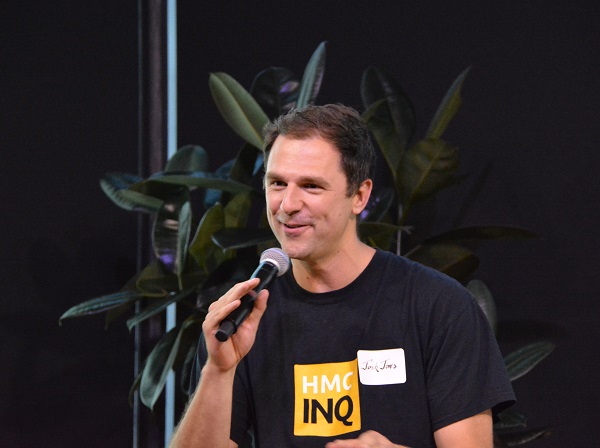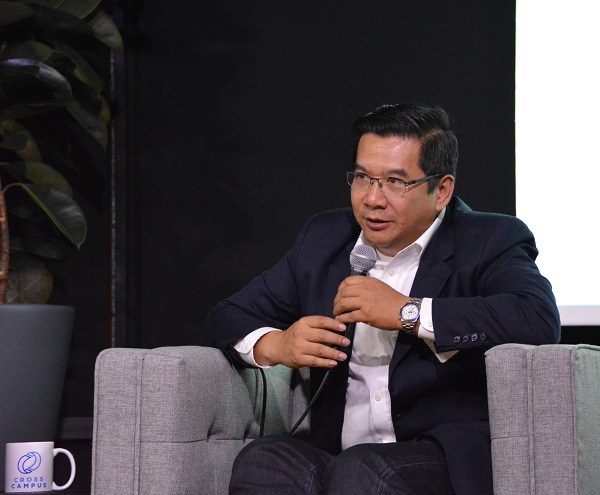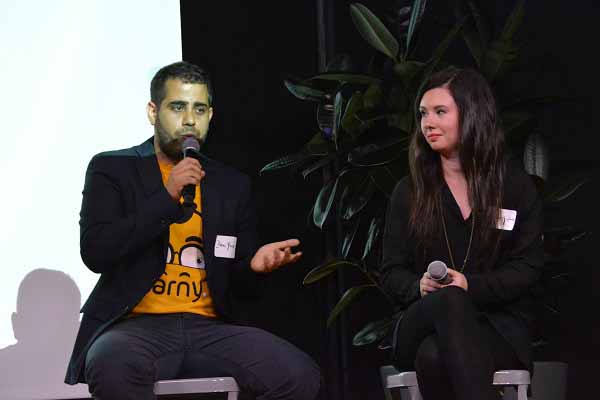by Dot Cannon
“Grab a seat, grab a drink, grab some food–not necessarily in that order,” invited IDEAS™ Immersion founder David Dorfman.
Laughing and talking, attendees at Thursday evening’s “The Funding Lifecycle of Start-ups” complied. But the real sustenance they’d receive, during their evening at the downtown LA Cross Campus facility, was yet to come.
IDEAS™ Immersion California, which evolved from the 2016 IDEAS™ Los Angeles program, is a project sponsored by Tel Aviv University-American Friends. The goal: to bring together talented Israeli and American entrepreneurs with investors, businesses, community organizations and institutes of higher learning, in a multi-week business accelerator program.

Lessons for small-business entrepreneurs on pitching, fundraising and operation would be the main feature of this first open-to-the-public event of 2017 IDEAS™ Immersion.
“We want to keep this very interactive, (and) very fun,” said moderator Dave Whelan, of Bespoke Business Strategies, Inc. as the program started.
He and his panelists would more than achieve those goals.

The panel included founders of four startups, each at a different stage of getting funded. Venture capitalists and angel investors would be joining them.
And the main theme: what works, and what doesn’t, for a startup–both in fundraising and in running the business successfully?
Entrepreneurs’ experience-based insights
DreamHost co-founder and former board member Josh Jones gave the audience a cautionary tale. He said that he and three fellow students at Harvey Mudd College created DreamHost webhosting as their first startup in 1996, while they were still undergraduates.
“We were computer science majors who’d never had a real job,” he said. “We didn’t even have a CEO–just four equal co-founders.”
This corporate structure, Jones explained, would prove challenging. “Our operating agreement was, none of us could ever be kicked out for any reason,” he explained.
Four individuals’ varying work styles and four equal votes, predictably, led to problems.

Jones said that at one point, another well-known webhosting company wanted to buy DreamHost.
“(The) founders kept waffling, wanting higher prices,” he said. “‘100 million? We should try to get 110’.”
Ultimately, he said, DreamHost never sold. The other co-founders bought Jones out, and he moved on to other projects. (Currently, he is a partner in the new Harvey Mudd-only business incubator–which starts its first class session for startups in autumn of 2017.)

Where Jones had warned against partnering with individuals whose work styles and perspectives may not be compatible, Home Hero co-founder and COO Mike Townsend offered some insights on networking. When attending an event such as this particular meetup, he told the audience, one thing to avoid was becoming a “business card machine gun”.
“If you walk away meeting one person that you had a real solid relationship with, that is successful,” he advised.
Guest investors’ perspectives

After Jones and Townsend had talked about their experiences, three guest venture capitalists joined them onstage.
Scopus Ventures chair and managing partner Bahram Nour-Amid, Scopus Ventures managing partner Robert Mai and Amplify.LA vice-president Eric Pakravan would be speaking with the startup founders–and the audience.
Tenacity, hard work and timing are all essential qualities for entrepreneurial success, Nour-Amid began.
“You have to be smart, but more importantly, you have to be lucky,” he said.
Nour-Amid said Scopus had set up a venture fund right after the dot-com collapse.
“Then, 9/11 happened, so all the stars were aligning against us.”
But, Scopus survived on its strengths. “It’s important to have a good product,” Nour-Amid said, “but it’s critical to have a strong entrepreneur.”

Part of that strength, said Amplify.LA vice-president Eric Pakravan, is the willingness to put in the necessary hard work.
“You won’t be successful (because you went to this big workshop),” he said. “We think what really works is time invested.”
A Q and A exchange
Then, the guest investors had questions for the startup founders.
“Josh, if you had to do it over again, would you have four founders in the company?” asked Mai.

“No,” Jones answered. “Maybe two co-founders would be the best. Maybe three, but if you do have four co-founders, make them different.”
“Why did you choose healthcare?” Nour-Amid asked Townsend, of his participation in co-creating Home Hero.
“My partner’s father was struggling to find home health care for his grandmother,” Townsend replied. He also offered a guideline, later on in his answer, for beginning entrepreneurs.
“I think if you’re looking for advice, the best place to find it is someone who’s six months to two years ahead of you,” Townsend said. “We had a coworker from Facebook (who could say) ‘here’s what I learned and how I grew from Facebook'”.
Guidance from two other perspectives
Two additional startup founders, at two other stages of funding, took the stage next to interact with the investors.
MARBL.io co-founder and CEO Tatiana Koffman is currently in the process of raising funds for her startup. Earny founder Dori Yona has completed a successful fundraising campaign.
Koffman told the audience that she and her co-founder had literally drawn out their concept for MARBL, which is a global travel community for millennials, on sheets of paper. Then, they’d begun the fundraising process.
“I thought it would be easy. Big mistake,” she said.
The challenge, Koffman said, was to create a great tech product, get an audience and keep them–all while raising the needed funds. But she and her co-founder had now garnered 10,000 followers on Instagram, within six months.
At the time of the meetup, Koffman said MARBL.io was twelve days from launch. She also had meetings lined up with angel investors within the next few days.
Understanding the market, she said, was key.
“We know our users now, inside and out, and we know what they want,” she continued. “Eight months ago, we were sitting in my apartment with pen and paper.”

Meanwhile, said Yona, the key to his success was solving a problem–and again, luck and timing.
“We launched Earny one year ago, exactly,” he said, of his Mastercard-based app which refunds overpayments when purchased products go on sale. “We’ve raised, so far, over two and a half million dollars.”
Yona told the audience that he’d created Earny after purchasing a blazer for a dinner event. To his chagrin, a friend was able to buy the exact same item for half the amount Yona had paid.
Yona began researching and negotiating for a refund.
“After about a week of back and forth, I was able to get that $65 back,” he said. “That kind of got our wheels turning, as entrepreneurs.”
Then, he said, he and his friend went to a hackathon about a week later. Not only did they build a prototype for Earny and win first place, but one of the judges was from MasterCard.
“And he said, ‘Guys, I want to see you next week.'” 
More questions
“How do you make money?” asked Nour-Amid.
“We keep twenty-five percent of the money we save the client,” Yona answered.

“How do you convince your audience to contribute to the actual (MARBL) platform?” Mai asked Koffman.
“For us, our bread and butter is influencers and bloggers,” she replied. “We asked people, ‘how did travel change your life?'”
Shortly afterwards, Jones rejoined the panel for the final questions–from the audience.


One audience member asked the investors what three top metrics they’d look for, when deciding to fund a startup.
“Define why your business model works. Use your facts and figures to support that story,” Pakravan replied.
“Assuming (the facts and figures are in place), the next three factors would be entrepreneur, entrepreneur, entrepreneur,” Mai said. “I generally try to invest in companies with a maximum of two founders: one with management (skills), one in tech.”
“Are they willing to work hard?” contributed Nour-Amid. “Do they have a good head on their shoulders? What did they learn from (previous) failure?”

And–a reading list
But, one of this reporter’s favorite questions came from an audience member who wanted to know one book each panelist had read, that he or she would recommend. Among the books the panelists named were:
Rich Dad, Poor Dad by Robert T. Kiyosaki
Venture Deals, by Brad Feld and Jason Mendelson
Traction, by Gabriel Weinberg
Pitch Anything, by Oren Klaff
Final thoughts for entrepreneurs
As the evening wound down, the takeaways continued.
“In my experience, no one is going to give you money from a paper drawing,” Koffman said, explaining how she and her co-founder had “gone to the smartest friends we had” for assistance in coding and creating the MARBL platform. “Investors really want to see where you’re going to succeed, where others have failed.”
Another audience member asked the investors what they looked for, when choosing a startup with whom they would work.

“Somebody who can dream big,” Pakravan said. “Somebody who has hustle.”


“Passion,” said Mai. “At the same time as being humble, eager and restive. It’s like dating.. I’m going to be working with the entrepreneurs any time (they need me)… I would encourage entrepreneurs, don’t take the first money in. Can you work with this VC?”

“Leadership,” said Nour-Amid, “(Being) able to communicate with people around them, able to rally the team. You want to have somebody who has all the characteristics and elements, potentially, of becoming a CEO.”
And Yona offered a final perspective on pitching, for startups.
“The goal is not to raise money. It’s something that’s on your to-do list. (But) pitching your company is the heart of storytelling…and you need to be able to tell that story.”
